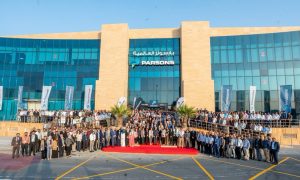Coronavirus: Losberger De Boer reports hike in Middle East enquires for mobile treatment systems
Systems are already in use to support efforts to combat COVID-19 in Italy

Losberger De Boer, a leading supplier of temporary structures, has reported a 50% increase in enquiries across the Middle East for rapid deployment systems, which can be used as mobile hospitals, isolation areas and/or decontamination systems.
In a statement, the company said its rapid deployment systems division is already supporting the efforts of medical professionals in Italy, in order to combat the country’s outbreak of COVID-19, where hundreds of tents have been installed to expand the country’s medical facilities.
The escalation of the pandemic has led to growing concerns that hospitals and medical facilities around the world may become overwhelmed. As public and private healthcare providers review their capacities and work with governments to formulate preparedness strategies, some are looking at how they can increase the number of patient beds, the statement added
Citing the example of China, where two hospitals were successfully built in Wuhan in less than two weeks, Tahar Zaouche, Losberger De Boer Middle East and Asia’s rapid deployment systems business development director, said that countries are currently sourcing similar solutions to ensure patients can be treated as part of their preparedness measures.
“Shortly after the reports of COVID-19 cases in the region, hospital and clinic operators began contacting us to find out what structures could be utilised in the fight against the pandemic. We have experienced a 50 per cent increase in enquiries for our temporary medical solutions so far, with more enquiries every day,” Zaouche said.
He pointed out that in 2014, the company had designed, developed and delivered interconnected textile vacuum cabins that were hermetically sealed with an isolated air supply and extraction system in just three weeks. The specialised medical system served as the world’s only evacuation facility for highly contagious patients during the Ebola outbreak.
“Losberger De Boer is also one of the world’s largest suppliers of quick-to-build emergency accommodations with experience of supplying triage centres, hospital wards, isolation facilities and morgues to existing hospitals, local and national government authorities, major NGOs and the United Nations.
“We also support organisations who provide staff accommodation in situations where workforces or large numbers of people need to live in quarantine conditions. Fully functioning facilities can be operational within hours or days, depending on the solution and the situation,” Zaouche added, highlighting that the company’s inflatable TAG and TMM tents are ready to be used within minutes thanks to their inflatable frames.
These tents can be carried by hand and can be installed by a team of two people, using an electric inflator. The modular design of the tents ensures they can be connected to each other in any direction, with each configured to hold up to 50 people.
The inflatable tents can remain ‘in situ’ and operational for multiple months if required. Where longer-term solutions are required, Zaouche said the company’s modular isolation centre, which is a 600sqm structure large enough to accommodate multiple wards, waiting areas, laboratories and washroom facilities, can be utilised. These centres have adequate space available to ensure contagious patients can be isolated and treated without affecting patient flow within the hospital.
He added that Losberger De Boer also offers decontamination units which can be connected to its range of inflatable tents and modular units. These units can decontaminate up to 80 people divided into three parallel lines per hour and can be operational within one hour of delivery.

























